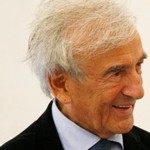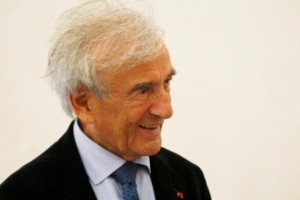
Elie Wiesel, the Nobel Peace Prize recipient, Holocaust survivor and author of more
than 50 books, has accepted an appointment as a
Distinguished Presidential Fellow at Chapman
University.
Chapman President James Doti revealed the appointment of the author of the internationally acclaimed Night during today's Opening Convocation in Orange attended by nearly 1,200 new
Chapman students and their families.
]

According to a statement released by the private university,
Wiesel will spend spring semesters at Chapman through 2015. He will retain his faculty position at Boston University as well.
During his Chapman fellowship, he will meet with undergraduates in Holocaust history courses and possibly other disciplines, including history, French, religious studies and literature.
Complete plans for his fellowship activities are still in progress, according to the university statement.
“In 2005 and again in April of this year, we were fortunate to
welcome Professor Wiesel to our campus,” Doti is quoted as saying in the release. “It
is rare to have a Nobel Peace Prize laureate visit once, let alone twice–and we knew we were among a very few select institutions in the
world.
“That this remarkable individual, one of the world's most
famous and respected people, one who truly exemplifies the meaning of
'global citizen,' should choose to return to spend time with our
students is truly a tremendous honor for Chapman,” Doti continued. “Of all the many honors
and prestigious titles Professor Wiesel has received, the one he treasures the
most is that of 'teacher.'”
“On my two visits to
Chapman University, I was profoundly impressed by the quality of the students
and faculty, in particular Dr. Marilyn Harran, and by the way in which the
university is teaching and remembering some of the most tragic events in human
history, events that have had such a deep influence upon my life,” Wiesel says in the Chapman statement. “For
these reasons, I have made the decision to return to Chapman annually as
Distinguished Presidential Fellow.”
Harran, the Stern Chair in Holocaust Education, a professor of Religious
Studies and History and director of Chapman's Rodgers Center for
Holocaust Education, says in the release, “Professor Wiesel has been the face and voice
of Holocaust memory and witness to the world, and an ambassador of humanity and
hope for decades. He has consistently challenged us to learn from the
Holocaust and to reject indifference, and–in his words–'to think higher and feel deeper.' We are unbelievably fortunate
that he has chosen to return to Chapman and to share with us his knowledge and
wisdom.
“I am stunned and deeply grateful that he will be with us in this
new role as Distinguished Presidential Fellow,” she continued. “I know our university
community will be profoundly enriched and inspired by his presence.”
According to the university, Wiesel first visited Chapman in April 2005,
when he took part in dedication
ceremonies for the university's Sala and Aron Samueli Holocaust Memorial
Library. During that visit, which also marked the 60th anniversary of his liberation from the Buchenwald
concentration camp, the university presented him with an honorary
doctorate in humane letters, and unveiled a large bronze bust of Wiesel near the entrance of the Holocaust Memorial Library.
He visited Chapman again this past April to be guest of honor at the university's gala
“Our Promise to Remember: An Evening of Humanity and Hope,” which marked
the 10th anniversary of the Rodgers Center
and the Stern Chair.
During his Orange swing, Wiesel spoke to Chapman students
and to middle and high school students who submitted winning entries in the
annual Holocaust Art and Writing Contest sponsored by Chapman and The
“1939” Club, a Holocaust survivor organization, according to the university.
Wiesel's official biography, courtesy of the Elie Wiesel
Foundation for Humanity, follows after the jump . . .
[
Elie
Wiesel was born in 1928 in Sighet, Transylvania,
which is now part of Romania.
He was 15 years old when he and his family were deported by the Nazis to
Auschwitz. His mother and younger sister perished, his
two older sisters survived. Elie and his father were later transported
to Buchenwald, where his father died shortly before the camp
was liberated in April 1945.
After the war, Elie Wiesel studied in Paris and later became a journalist. During
an interview with the distinguished French writer Francois Mauriac, he was
persuaded to write about his experiences in the death camps. The result was his
internationally acclaimed memoir, Night
(La Nuit) which has since been
translated into more than 30 languages.
In 1978, President Jimmy Carter appointed Elie Wiesel as
Chairman of the President's Commission on the Holocaust. In 1980, he became the
Founding Chairman of the United States Holocaust Memorial Council. He is also
the President of The Elie Wiesel Foundation for Humanity, an organization he
and his wife created to fight indifference, intolerance and injustice. Elie
Wiesel has received more than 100 honorary degrees from institutions of higher
learning.
A devoted supporter of Israel,
Elie Wiesel has also defended the cause of Soviet Jews, Nicaragua's
Miskito Indians, Argentina's Desaparecidos, Cambodian refugees,
the Kurds, victims of famine and genocide in Africa, of apartheid in
South Africa, and victims of war in the former Yugoslavia.
For more than fifteen years, Elie and his wife Marion have been
especially
devoted to the cause of Ethiopian-born Israeli youth through the
Foundation's Beit Tzipora
Centers for Study and Enrichment.
Teaching has always been central to Elie Wiesel's work. Since
1976, he has been the Andrew W. Mellon Professor in the Humanities at Boston University,
where he also holds the title of University Professor. He is a member of the
faculty in the Department of Religion as well as the Department of Philosophy.
Previously, he served as Distinguished Professor of Judaic Studies at the City
University of New York (1972-76) and the first Henry Luce Visiting Scholar in
Humanities and Social Thought at Yale
University (1982-83).
Elie Wiesel is the author of more than 50 books of fiction and
nonfiction, including Night, A Beggar in Jerusalem (Prix Médicis
winner), The Testament (Prix
Livre Inter winner), The Fifth Son
(winner of the Grand Prize in Literature from the City of Paris), two volumes
of his memoirs, All Rivers Run to the Sea
and The Sea is Never Full, and
most recently, The Sonderberg Case.
For his literary and human rights activities, he has received
numerous awards, including the Presidential Medal of Freedom, the U.S.
Congressional Gold Medal, the National Humanities Medal, the Medal of Liberty,
and the rank of Grand-Croix in the French Legion of Honor. In 1986, Elie Wiesel
won the Nobel Prize for Peace, and soon after, Marion and Elie Wiesel
established The Elie Wiesel Foundation for Humanity.

OC Weekly Editor-in-Chief Matt Coker has been engaging, enraging and entertaining readers of newspapers, magazines and websites for decades. He spent the first 13 years of his career in journalism at daily newspapers before “graduating” to OC Weekly in 1995 as the alternative newsweekly’s first calendar editor.

